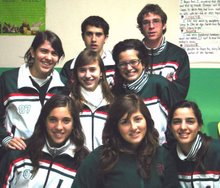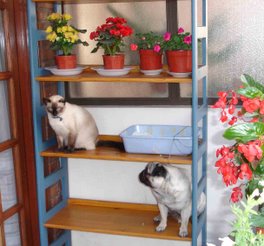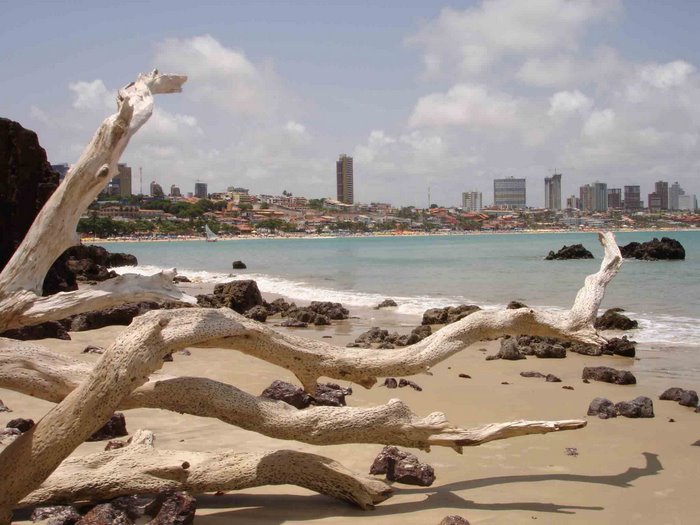Uncle Ayub swung me round and round
till the horizon became a rail
banked high upon the Himalayas.
The trees signalled me past. I whistled,
shut my eyes through tunnels of the air.
The family laughed, watching me puff
out my muscles, healthily aggressive.
This was late summer, before the snows
come to Kashmir, this was picnic time.
Then, uncoupling me from the sky,
he plunged me into the river, himself
a bough with me dangling at its end.
I went purple as a plum. He reared
back and lowered the branch of his arm
to grandma who swallowed me with a kiss.
Laughter peeled away my goosepimples.
This was late summer, before the snows
come to Kashmir, this was picnic time.
After we'd eaten, he aimed grapes
at my mouth. I flung at him the shells of
pomegranates and ran off. He tracked
me down the river-bank. We battled,
melon-rind and apple-core our arms.
'You two!' grandma cried. 'Stop fighting, you'll
tire yourselves to death!' We didn't listen.
This was late summer, before the snows
come to Kashmir and end children's games.
What's your impression of the poem? What do you find interesting in it? What's noteworthy? What's the tone of the poem? How is it similar or different from the extract we read in class?
Your assignment:
a) Post a comment with your analysis of any aspect or personal reaction to the poem. You may answer any of the questions above or any one your classmates have posted.
c) End your comment with a question for your classmates to keep the discussion going. You may or may not have the answer for it!
You may post a comment as many times as you'd like. You are required to participate with at least one comment, but since this discussion is intended to help you gain further insight in preparation to write your essay, you may want to keep the discussion going.
Wednesday, May 30, 2007
Subscribe to:
Post Comments (Atom)






13 comments:
After reading several times the poem I firstly concluded that it is a childhood memory and also it is a happy time of the writer's life. We are able to get this feelings because of the presence of some words or phases, like:
"The family laughed"
"This was late summer"
"before the snows come to Kashmir and end children's games"
"Laughter peeled away my goose pimples"
I think that this poem is in a way a reflection of each one of us childhood, in the sense that all of us have such a great moment and memory with our families and brothers having fun in nature while having lunch on a sunny Sunday.
So, this is one aspect that I recalled while reading the poem. Another point that I find interesting is the comparison the author makes between the situation and the nature. In this way we are able to get a clearer vision of what's going on all along the poem. For example:
"the trees signaled me past"
"shut my eyes through tunnels of the air"
"then, uncoupling me from the sky"
"till the horizon became a rail banked high upon the the Himalayas"
Finally, what I find noteworthy is the change between first and second reprane and the last one. Because the first one says "This was late summer, before the snows come to Kashmir, this was picnic time" unlike the last one that says "This was late summer, before the snows come to Kashmir and end children's game". This are important details in order to get the writer's feelings, because in a way in the last reprane he wants to conclude the poem by saying, memories would always be in our minds and souls but we cannot live in them - we must keep on living. Maybe it is the end of childhood but there's a long way to walk - Besides what we got as kids is what we are as teenagers or adults.
This is what I get !!
I leave a question to you all :
what do you think about the last point I gave in my "reaction" ?
The Picnic in Jammu is written in first person singular, what is different from the text read in class as it was in third person singular. The speaker is an adult, or young adult remembering his childhood, the games he used to play with his uncle and how happy he was at those times. The tone of the long stanzas is really joyous, euphoric, and it is how the author shows us the happiness of the child, the excitement he has.
Adding something to what Flor said about the comparison of nature and the child, the other text also had those comparisons. I think the comparisons are made as a way to show the importance the nature has in this situation. The author is describing what the boy and his uncle do and the atmosphere, environment in which they are. Nature shows in some way this joy of the character and it is because of the comparison. But then, when the snows came, childhood was over. It is another strong comparison. Most people don’t like snow, everything becomes cold, and in this poem, when the snows come – which is nature too - the euphoria ends.
There is no rhythm along the poem, the lines don’t rhyme, but the stanzas have a regular length. There is a long one, then a short refrain, a long one again, the refrain repeats, another long stanza and finally the refrain, but with several changes. This change is what shows that the speaker is an adult and that childhood has ended. There’s a change on the typography of the refrain: it is in italics. So, there is no rhythm between one line and the following, but there is a structure followed, which shows us some rhythm.
There are some sensor images like ‘the trees signalled me past’ or ‘the family laughed, watching me puff out my muscles’. The whole poem is based on a description, so visual images can be found very easily. Some metaphors are also present: ‘the horizon became a rail’ or ‘he reared back and lowered the branch of his arm’. As there is a constant comparison with nature, we can find some similes, like: ‘I went purple as a plum’.
About Flor’s point, I think that childhood is something difficult to get rid of. Or at least, that happens to me. Memories of my old times always come back to my mind and they were really good times, no worries, just games, innocence, fun… But it is true, even if we don’t want, our bodies grow up and our minds should accompany that growth, so we must mature even if we don’t like. I must admit that it was very pleasant living when parents did everything for you, you had only some little obligations, but it is interesting to grow up, too. I think that what we must do is grow up, develop our body, mind and soul, and at the same time bring back old memories that make us feel good about our past. Childhood is something with a lot of significance to me (typical of a fan of The Little Prince... jeje) and as I consider I’ve had a great childhood, I feel free to remember all those times and I love doing it! Someday snows must come and we have to end with those childish games. We don’t realize until some time later, when we want to do things we used to, and we can’t anymore. It is sad, but is the real truth and we must assume it. We have to learn to grow up and to leave things behind. There are things we cannot carry with us all our lives. We have to learn to say goodbye to many things – even if it hurts - and to take with us the memories of it.
I want to leave a question here. The impression I got the first time we read the poem was that one of them had died: even the kid, or the uncle. What the grandmother says there, I thought that it had a significance:
“‘You two!’ grandma cried. ‘Stop fighting, you’ll
tire yourselves to death!’ We didn’t listen.
This was late summer, before the snows
Come to Kashmir and end children’s games”
As anyone commented about it in class, I assumed I was wrong, but I still want to let you know my first impression of it. When I finished reading the whole poem that first time, I considered that the boy didn’t really like to be the centre of attention, what the whole family was laughing of, watching to. His uncle lifted him, took him from here to there, then plunged him into the river, he was cold. The impression I got wasn’t really pleasant. Even the author says that the uncle made grandma swallow the kid with a kiss, which is a typical image, and something that any child likes. So, when I reached the end, when they start fighting, then the grandmother says those words and suddenly the end of children’s games arrive, that told me that something sudden had happened, and it gave me the impression of a sad end.
I don’t know if any of you got that impression too… I want to know if anyone did, and if you didn’t even thought of it as I did, to consider my view and tell me what you think…
I like the poem because of its great descriptions and uses of metaphors, comparisons and images that let us imagine the situation.
As my partners said I think the narrator is an adult or a young adult talking about his happy childhood. In my opinion the narrator is depressed at the moment of narrating as he says `This was late summer, before the snows come to Kashmir and end children's games.´´ I think he is sad because he had to left his happy childhood and now he doesn´t find happyness.
Answering to Valentina´s question, I had never thought about what she says and although it might be possible that one of the characters have died, I don´t think so; I think he quotes his grandma saying that they will tire theirselves to die and then he says they didn´t listen to her only as an anecdote.
My question is if do you also think the narrator is not happy at the moment of narrating?
Hey Lucas! Thank you for your answer... yes, maybe it was just an anecdote and through it he is saying that they kept on playing, not caring about what the others said... maybe...
And, I don't know if the narrator is not happy at the moment of speaking, as he is remembering good times (if you consider them like that...). I think that he asumed he had to grow up and end children's game... Anyway, his memories are good, so he might not be so unhappy.
The Picnic in Jammu
In this poem I find that the writer is describing different stages of a moment or perhaps of his life. He separates each stage through the use of refrains that connote the happy times he had before something bad occurred to him “before the snows come to Kashmir”.
Through the first and second stanza, I see how everything is joyous, fun; they were good times accompanied by the description of the beauty that nature and his family has. But in the third stanza, though he continues to narrate this beauty mentioned, he includes rough images through the use of more intense descriptions, like “we battled, melon-rind and apple core our arms”, as if they where hurting each other badly; and consequently mentioning death through a saying, which reflects in the third refrain, where “the snows come to Kashmir and end children’s games” where I imagine that it was either time to grow, to live through the winter where snow takes joy and fun out of him; or perhaps, as Vale Becker says, that someone dies or something (expressed through the snow) kills his happiness.
According to ValeBe’s opinion, I don’t think that he doesn’t like being the centre point of his grandma and uncle; he enjoys all the attention, like all kids do. And perhaps this is why he finishes with a sad refrain where his childish games end, because he loses all the attention and the “picnic times” (happy times), because his grandma or uncle leave or die…
My question is: Why do you think he chose his grandma and uncle as main figures in his family and happy joyfulness? Could they be two persons that passed away and left a scar in his heart in the authors’ real life?
This extract is written with a prose structure in first person singular, while the other extract (‘The Joy of Living and a Superfluity of Youth’) as a short story in third person singular. The voice of the author in the first one is of a young adult that is remembering a very important moment of his life; while the second is a 15 year-old boy who is celebrating his birthday, an important moment of his life as well.
Despite making use of a great variety of images to describe the scenario, the nature, the authors differ in the aspect they want to show of it. In the poem (or song), there’s moment in which the descriptions have a negative effect on the imagination of the reader, such as gloomy. On the other hand, in the story or text, the descriptions of the environment are positive, leading to the reader an optimistic character.
This poem has three long stanzas and a two-lined verse after each one. As Vale Marún said, I think each stanza represents a stage of life: childhood, maturity and the old age (death).
I find what both Vales’ said very interesting as I didn’t realize any of their observations. In my opinion, somebody might have died, but it can also show how careless they were in that moment.
As an answer to Vale Marún’s question, I believe the author chose his grandmother and uncle as main figures because they might have been the ones who raised him. That would explain why the end affirms the gloomy tone of the author; because of the death of his grandma, represented a time in which all the joyfulness and happy memories reach to an end, a sad and cold end.
Finally, I would like to ask what you think about this part of the poem:
‘The family laughed, watching me puff
out my muscles, healthily aggressive.’
I think this is a great poem because of the way it is written,it is incredibly atractive and when you read it you feel identified with it.You feel as if you where the writer who expresses and narrates all this emotions and sensations while remembering his anecdote of a moment in childhood when he was playing with his uncle .It has so much details that it transports you into the scene and makes you become part of it. The methapors and comparisons make it even more interesting,transforming it into an awsome piece of work.
In respond to laura's question, I think the author wants to express a moment of freedom and relax because he says his family was laughing while he was puffing his muscles out.
The question I want to leave is: What do you think the last phrase of the poem refers to, the end of childhood in the boy or the death of the boy?
Charly de article is ready. You can read it at (is tha right preposition?)www.quorumtuc.com.ar or www.muchachademanosfrias.blogspot.com
I hope you like it!!
The first time I read this poem I didn’t understand it very well, maybe because there were many words that were strange to me or because we read it too fast. I usually need to reread several times each peace of work to understand it. As the two Vales, my first impression was that someone had died, but each time I read the poem again I discovered new details that made me change its meaning.
In my opinion, and as an answer to Lucas’ question, the narrator is very happy at the moment of writing because he is remembering his beautiful childhood. He remembers it as a time when he had a lot of fun and enjoyed being with the persons he loved, as family. Maybe he recalled some happy event in the past and that inspired him to write about his childhood, and in one moment, he realizes that his life has changed, that he’s now with lot of pressure, stressed and has many responsibilities. At that past time he was free, happy, and had nothing to worry about. But his present life is not so calm and pleasant; he now has to deal with life and life is full of likes and of dislikes. I think that’s why he ends his poem with a different refrain, because he realizes that he is different. He does not play as much as he used to.
The snow is presented as something negative. “This was late summer, before the snows come to Kashmir, this was picnic time. (…) This was late summer, before the snows come to Kashmir and end children's games.” This is a metaphor. When snow falls it covers every inch of surface. Snow has fallen in his life and now he has to move forward; he can’t return, though he remembers what was down the snow.
I’ve read ValeMe’s opinion and I disagree in one point. “We battled, melon-rind and apple-core our arms.” When I read this sentence I imagined uncle and boy playing a very funny game, a scene full of colour because of the fruits and full of energy and enthusiasm because it was a battle. I’ve never imagined it as a violent act or as if they were hurting each other badly. I saw this as a game that everyone enjoyed.
As you grow mature you will experiment thousand of changes that make you go on in life, experiences that make you live each day. But this doesn’t mean that you have to forget all you’ve done. We construct our future from our present and past life. If we live thinking about our past, life will pass us by. In the other way round, if we don’t think about the past we would never know what to do or where to go. Neither extreme is good. We have to have a guide in life to achieve our goal; that guide is our past and our goal is our expectancies.
Don’t say goodbye to childhood. When you are a child parents construct you: your personality and your manners. They guide you when you’re a child; you can’t get rid of this taught because it’s a part of you. As you grow old you will change. You can change your present life, but not your past.
-
In the literary aspect, the poem is full of techniques: metaphors (“who swallowed me with a kiss”, “till the horizon became a rail”), personifications (“The trees signalled me past”), visual (“banked high upon the Himalayas”) and touch (“uncoupling me from the sky, he plunged me into the river”, “who swallowed me with a kiss”) images, similes (“I went purple as a plum”), ect. Sentences continue from one line to the following i.e. they start in one line and end in the next one. The poem is a narrative composition because it tells a sequence of actions.
Yes i also had the same feeling that theres some sadnes in thenlast stanza. when i read the poem 1st time i thought they are comparing this fight with the fights that happn in kashmir actually
I still dont understand clearly the meaning of lines..you'll tire urselves till death...i have to explain it to my child can any one give meclear and esy description asin his notes its just written the end part of the poem is sad as it describes about the war and fight.
???????
I see that many people haven't said anything about the context of this poem. This poem was written by a person who was forced out of his beloved country by the war between Pakistan and India. The war made him lose his family/ leave his family behind.
The end of the 5th stanza sounds solemn and threatening, this captures the essence of the war to come.
The last stanza conveys that the time for playing games and for lighthearted fun is over.
1st stanza: Recurring theme of trains. "rail", "whistled", "tunnels", "puff"
3rd stanza: Recurring theme of fruits. "dangling", "purple as a plum", branch", "swallowed", "peeled"
5th stanza: Recurring theme of war. "aimed", "flung at him the shells", "tracked", "battled", "arms", "fighting"
I'm not super sure if all this is correct but my teachers have taught it to me this way :)
Post a Comment